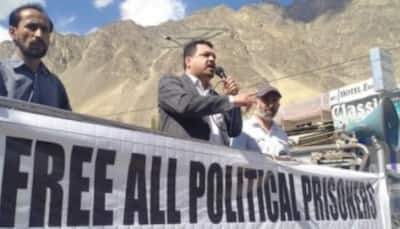World
Residents of Gilgit-Baltistan Demand Justice and Autonomy

Residents of Gilgit-Baltistan, a region administered by Pakistan, are intensifying their protests, demanding justice and the right to decide their future. Amidst freezing temperatures, local communities are increasingly vocal about their grievances, which include issues related to land rights, unjust taxation, prolonged power outages, and the encroachment of federal projects such as the China-Pakistan Economic Corridor (CPEC).
The governance of Gilgit-Baltistan has long been characterized by a lack of representation and autonomy. According to a report from the Washington-based Middle East Media Research Institute (MEMRI), the region has been governed through decrees from Islamabad, without any direct input from its residents. This situation stems from the Karachi Agreement of 1949, which transferred control of the area to Pakistan without including any local representatives. The report highlights that Pakistan’s approach to governance in Gilgit-Baltistan mirrors a colonial mindset, prioritizing central authority over participatory development.
Ongoing Protests Reflect Growing Discontent
The discontent among residents is palpable. In Skardu, the largest city in Gilgit-Baltistan, residents endure up to 22 hours of power outages during winter months. The local hydroelectric projects, such as the Satpara Dam, are failing to meet energy demands. Originally intended to provide electricity to 40,000 homes, the dam now delivers only a fraction of its capacity, leaving many families without reliable power.
Protests are common, with residents expressing frustration over issues like the GB Revenue Authority Bill, which imposes taxes without offering any representation in the decision-making process. This lack of voting rights in national elections further marginalizes the people of Gilgit-Baltistan, leaving them without a voice in policies that directly affect their lives.
Calls for Autonomy and Constitutional Rights
The residents’ demands extend beyond immediate relief. Activists are increasingly calling for constitutional recognition and genuine autonomy. Shabir Choudhry, a noted activist, warns that the region is on the brink of chaos if these issues remain unresolved. As protests grow louder, the yearning for justice, dignity, and self-determination intensifies.
Historical grievances also loom large. The people of Gilgit-Baltistan were not consulted when Pakistan entered into a border agreement with China in 1963, which ceded territory in the region to Beijing. Moreover, the construction of the Karakoram Highway has led to increased instability, facilitating the influx of weapons, narcotics, and militias, which have disrupted the social fabric and altered the region’s demographics.
As the residents of Gilgit-Baltistan continue to face these challenges, their calls for justice and the ability to shape their future resonate louder than ever. The ongoing protests underscore a critical moment in the region’s history, as its people demand not just rights but the recognition of their identity and aspirations within the broader political landscape of Pakistan.
-

 World4 months ago
World4 months agoSBI Announces QIP Floor Price at ₹811.05 Per Share
-

 Lifestyle4 months ago
Lifestyle4 months agoCept Unveils ₹3.1 Crore Urban Mobility Plan for Sustainable Growth
-

 Science3 months ago
Science3 months agoNew Blood Group Discovered in South Indian Woman at Rotary Centre
-

 World4 months ago
World4 months agoTorrential Rains Cause Flash Flooding in New York and New Jersey
-

 Sports3 months ago
Sports3 months agoBroad Advocates for Bowling Change Ahead of Final Test Against India
-

 Top Stories4 months ago
Top Stories4 months agoKonkani Cultural Organisation to Host Pearl Jubilee in Abu Dhabi
-

 Science4 months ago
Science4 months agoNothing Headphone 1 Review: A Bold Contender in Audio Design
-

 Top Stories4 months ago
Top Stories4 months agoAir India Crash Investigation Highlights Boeing Fuel Switch Concerns
-

 Sports3 months ago
Sports3 months agoCristian Totti Retires at 19: Pressure of Fame Takes Toll
-

 Business4 months ago
Business4 months agoIndian Stock Market Rebounds: Sensex and Nifty Rise After Four-Day Decline
-

 Politics4 months ago
Politics4 months agoAbandoned Doberman Finds New Home After Journey to Prague
-

 Top Stories4 months ago
Top Stories4 months agoPatna Bank Manager Abhishek Varun Found Dead in Well









